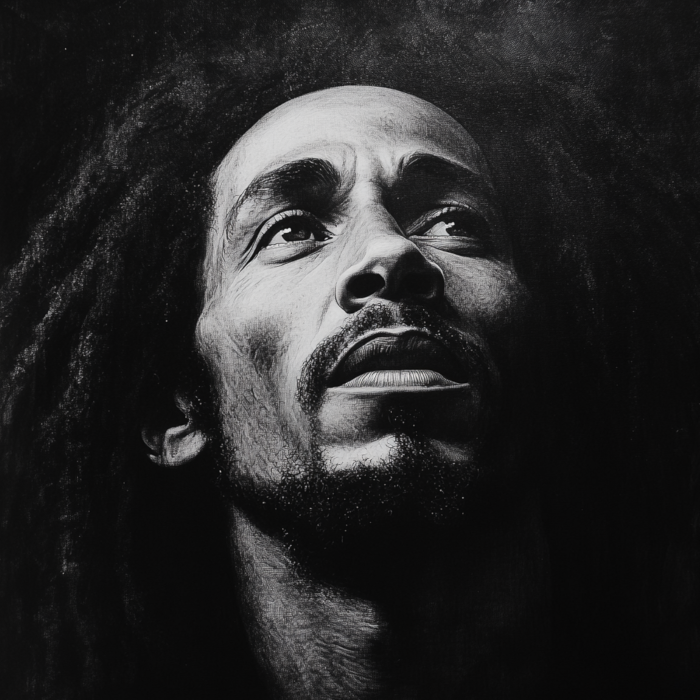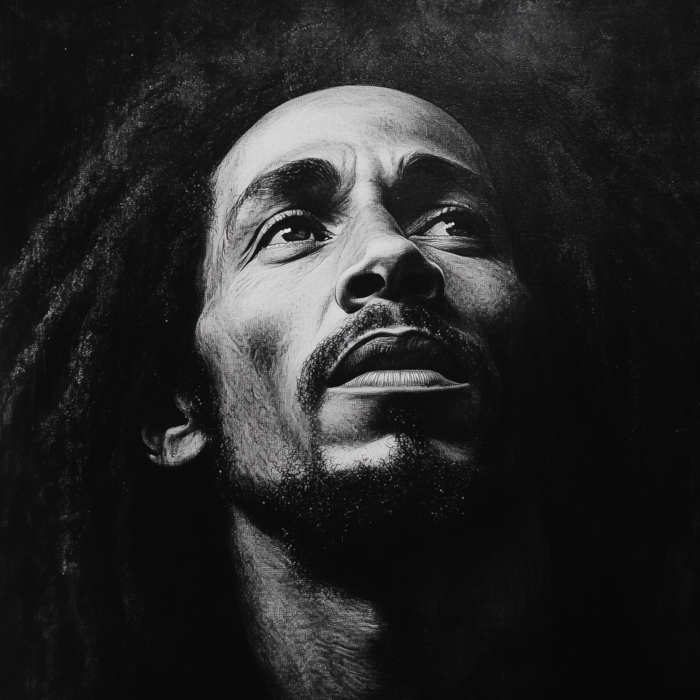


Bob Marley (1945–1981), born Robert Nesta Marley, was a Jamaican singer, songwriter, and musician who became an international icon, bringing reggae music and Rastafarian culture to the global stage. He is considered one of the most influential musicians of all time and is renowned for his messages of peace, love, social justice, and resistance against oppression. Marley's music continues to resonate with audiences worldwide, making him a lasting symbol of cultural and spiritual unity.
The Wailers: In 1963, Marley formed a band called The Wailers with his friends Bunny Wailer (Neville Livingston) and Peter Tosh (Winston McIntosh). The group initially performed in the ska and rocksteady genres, which were popular in Jamaica at the time. They achieved early success with hits like "Simmer Down" and "Soul Rebel."
Transition to Reggae: By the late 1960s, The Wailers, influenced by the Rastafarian movement and the social and political climate in Jamaica, began to develop the slower, bass-heavy sound that would become known as reggae. This new sound, combined with Marley's evocative lyrics addressing issues like poverty, oppression, and spirituality, began to gain them a wider audience.
Breakthrough Albums: The Wailers' international breakthrough came in the early 1970s after they signed with Island Records, founded by Chris Blackwell. Their 1973 album, Catch a Fire, was critically acclaimed and introduced reggae music to international audiences. This was followed by Burnin’ (1973), which included classics like "Get Up, Stand Up" and "I Shot the Sheriff," the latter of which was famously covered by Eric Clapton, further boosting Marley's popularity.
Bob Marley and the Wailers: After Bunny Wailer and Peter Tosh left the group to pursue solo careers, Marley continued under the name Bob Marley and the Wailers, with a new lineup of musicians. The band released a series of successful albums throughout the 1970s, including Natty Dread (1974), Rastaman Vibration (1976), and Exodus (1977). The album Exodus, which included hits like "Jamming," "One Love," and "Three Little Birds," became one of Marley's best-known works and solidified his status as an international superstar.
Messages of Peace and Social Justice: Marley's music was deeply rooted in his Rastafarian beliefs and his commitment to social justice. His songs often addressed themes of resistance against oppression, the power of love, and the importance of unity. Tracks like "No Woman, No Cry," "Redemption Song," and "War" became anthems for social movements around the world.
Political Influence: Marley was not just a musician but also a cultural and political figure. He was deeply involved in the political struggles of Jamaica, advocating for peace during a time of intense political violence in the country. In 1978, Marley performed at the One Love Peace Concert in Kingston, where he famously brought together the leaders of Jamaica's rival political parties, Michael Manley and Edward Seaga, on stage in a symbolic gesture of unity.
Cancer Diagnosis: In 1977, Marley was diagnosed with acral lentiginous melanoma, a form of skin cancer. Despite his illness, Marley continued to perform and tour. However, his health deteriorated over the following years as the cancer spread.
Final Tour and Death: Marley's final tour took place in 1980, during which he performed at several major venues around the world, including the historic Zimbabwe Independence Concert, celebrating Zimbabwe's liberation from colonial rule. Marley's condition worsened, and he sought treatment in Germany, but it was too late. Bob Marley passed away on May 11, 1981, in Miami, Florida, at the age of 36.
Legacy and Funeral: Marley was given a state funeral in Jamaica, attended by thousands of fans, friends, and dignitaries. He was buried in a chapel near his birthplace in Nine Mile, along with his Gibson Les Paul guitar, his Bible, and a stalk of marijuana.
Musical Impact: Bob Marley's influence on music is immeasurable. He popularized reggae music around the world, and his songs continue to inspire new generations of musicians. Marley's music transcends genres, blending elements of reggae, ska, rocksteady, and even rock, making it accessible to a global audience.
Cultural Icon: Marley is widely regarded as a global symbol of peace, freedom, and resistance against oppression. His image, with his dreadlocks, vibrant colors, and serene expression, is iconic and continues to represent the spirit of revolution and the fight for social justice.
Rastafarianism: Marley played a crucial role in popularizing Rastafarianism, a spiritual and cultural movement that began in Jamaica in the 1930s. His lyrics often reflected Rastafarian beliefs, including the veneration of Haile Selassie I of Ethiopia, the rejection of materialism (referred to as "Babylon"), and the spiritual use of marijuana (ganja). Through Marley, Rastafarian culture and symbols became known and respected worldwide.
Posthumous Honors: After his death, Marley received numerous awards and honors, including the United Nations Peace Medal of the Third World in 1978, the Grammy Lifetime Achievement Award in 2001, and a star on the Hollywood Walk of Fame. His album Legend (1984), a compilation of his greatest hits, remains one of the best-selling reggae albums of all time.
Enduring Legacy: Marley's legacy endures not only through his music but also through various cultural and charitable initiatives. His family, including his children Ziggy Marley, Damian Marley, and others, have continued his musical and philanthropic work, ensuring that his message of love, unity, and social justice continues to reach new audiences.
Bob Marley’s influence extends far beyond music. He is remembered as a visionary who used his art to advocate for change, unity, and understanding. His songs remain powerful anthems for peace and social justice, and his legacy as a cultural icon is firmly cemented in the history of music and global culture.

We use cookies
We use cookies and other tracking technologies to improve your browsing experience on our website, to show you personalized content and targeted ads, to analyze our website traffic, and to understand where our visitors are coming from. Privacy Policy.